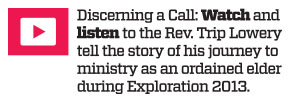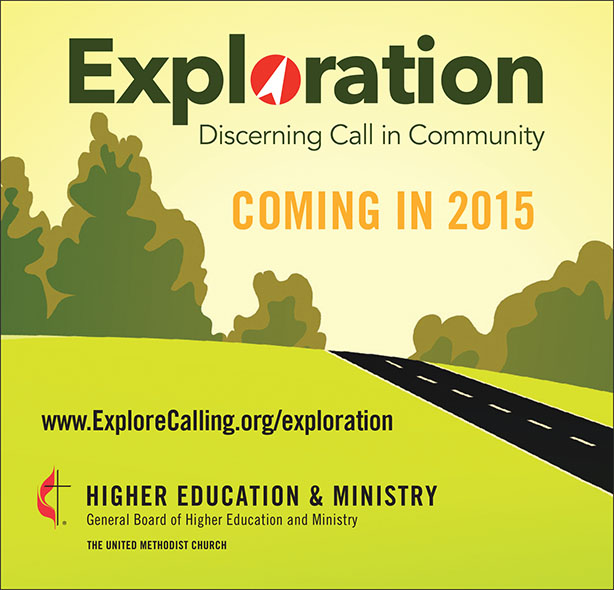


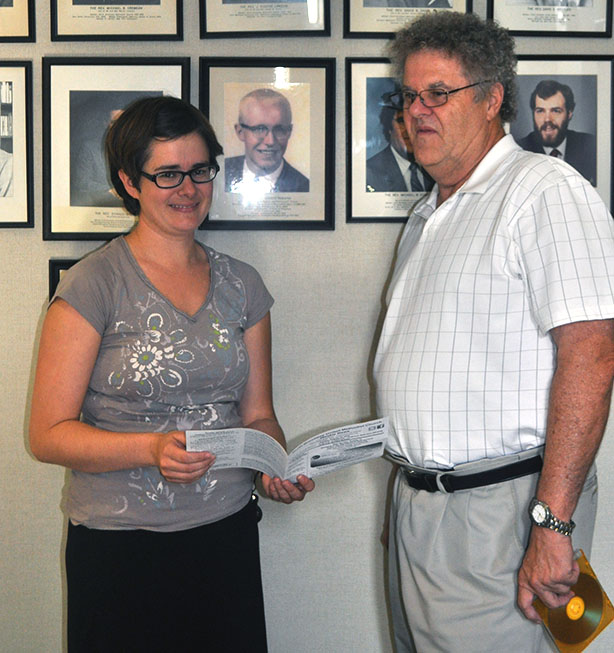
Beth Clark, a student at Methodist Theological School in Ohio, and the Rev. Michael Donnelly stand in front of a photo gallery of people sent into ministry from North Broadway United Methodist Church, Columbus, Ohio.
COURTESY PHOTO
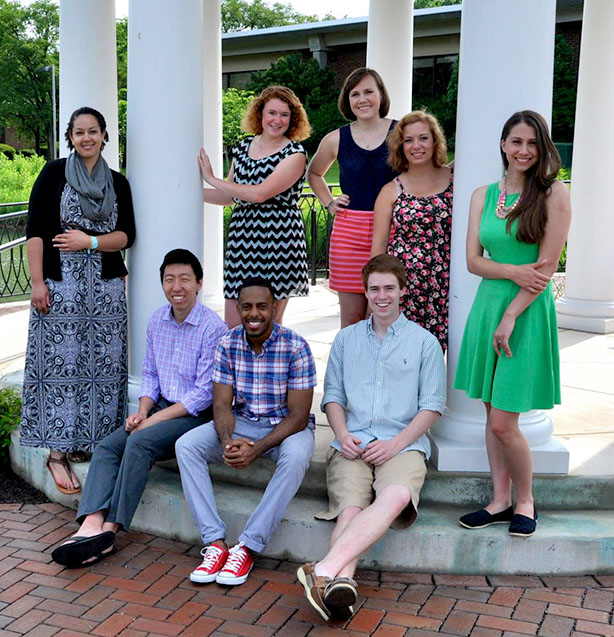
Calling 21 interns in the Virginia Conference spend a summer serving as pastoral assistants.
COURTESY MEREDITH MCNABB
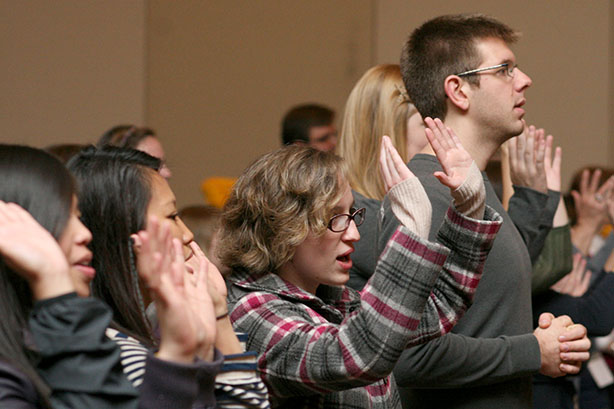
Exploration 2011 drew more than 650 young people exploring their calls to ministy. The next Exploration event will be in the fall of 2015.
UMNS/KATHY L. GILBERT

Exploration 2011 drew more than 650 young people exploring their calls to ministy. The next Exploration event will be in the fall of 2015.
UMNS/KATHY L. GILBERT
Somewhere, someone is hearing God’s call into ministry today.
What that means and how it might change that person’s life can only be determined during a deliberate journey of discernment.
The person sensing a call from God could be a younger or older adult considering their vocation – or an 8-year-old frustrated that the children’s choir helps lead worship only once a quarter.
The United Methodist connection wants to help anyone hear God’s call, identify what their gifts are and learn how those gifts can be used in the church, says the Rev. Trip Lowery. He is director of young adult ministry discernment and enlistment at the General Board of Higher Education and Ministry.
“If a young person feels they are being called into some kind of leadership position ... the church would be intentional about helping them hear who God is calling them to be, and then helping them into tracks that are going to develop that calling, or help them discern more,” Lowery says. “My role is to especially focus on those feeling called into ordained leadership, but the church is really working on helping all of the children – all of the church members – identify who God is calling them to be.”
Local church plays key role
For United Methodists, the discernment journey begins in the local congregation but can also include orientations, internships and other programs available through districts, conferences and the denomination.
“The local church is the very first contact that somebody who is feeling called is supposed to have,” Lowery says. “It’s important because this is the group of people that should know this person the most intimately.”
Their pastor and other church members “should have those intimate conversations to help them understand this voice they think they are hearing from God, and how to sort through that and see what they may be called to do,” he continues.
The congregation can also provide them with opportunities to serve in youth or children’s ministries, give their testimonies, help lead vacation Bible school or perhaps even preach.
Local churches serve both to affirm that someone has the gifts and skills to succeed as an ordained minister and as a guide to steer someone who lacks those traits into another calling. The discernment process usually includes numerous conversations with clergy serving the congregation and with the staff-parish relations committee.
To move a person in the process toward ordination, the staff-parish committee formally affirms his or her calling and essentially says, “‘We know you hear God speaking to you, and we hear it as well,’” Lowery explains.
Taking the first steps
Annual conferences have responded in various ways to new language in the 2012 Book of Discipline calling for an orientation to ministry to help declared candidates take the next step. Some have added daylong conferences to brief candidates about the certification process.
In the Tennessee Conference, a new Orientation to Ministry Program includes two retreats and three small-group sessions. Eight candidates with varying calls to become elders, deacons and local pastors are grouped together and meet with two mentor/facilitators during the six months between the two retreats, says the Rev. Terry Carty, who chairs the Orientation to Ministry Committee.
When candidates come to the first retreat, they have already written a letter to their district superintendent and completed paperwork for entry into the Board of Higher Education and Ministry’s online candidacy tracking program. However, they are not officially entered until later. Candidates also study the board’s candidacy guidebook as part of the program’s curriculum.
“One of the small-group sessions focuses on (John) Wesley’s theology and practice so they will have struggled through some of those sermons, but they also will have learned how to read a sermon by Wesley,” says Carty, who is pastor of Kingston Springs (Tenn.) United Methodist Church.
The semiannual retreats began in August 2013. The first group of 30 candidates was recently interviewed by district committees on ministry for certification and received high praise, Carty says.
“We want people to go into this with eyes open so that they don’t find themselves disappointed, or worse, still called, still passionate about ministry but totally frustrated because they can’t get through the steps,” he says.
Taking a taste
At North Broadway United Methodist Church in Columbus, Ohio, a gallery displays photographs of more than 20 clergy who have entered ordained ministry from that congregation. It is a reminder of the church’s success in helping members listen for God’s call.
“I think we’ve probably had, for the most part, pastors and lay leaders who were sensitive to discerning when someone had gifts for ministry, and raising that up for them,” says the Rev. Deborah Stevens, senior pastor. “People have been given chances to lead, to serve and to explore their passions.”
Several from the congregation have attended Methodist Theological School in Ohio in nearby Delaware, and several students from there are usually working at Broadway. For church members, Stevens says, “working alongside people who are called to ministry and in seminary and pursuing ministry sometimes evokes in you the sense that this might be something that I might feel called to do.”
In Alabama, Montgomery First United Methodist Church began a program several years ago with nearby United Methodist-related Huntingdon College. Each year, the church provides paid internships for about eight students to explore various aspects of ministry.
“We’re growing lay people to be leaders in their churches and church staff members, and then helping people to discern if they need to go to seminary and move into some other form of ministry that way,” the Rev. Lawson Bryan, senior minister, says.
The interns work at the church in their field of study, whether it is religion, social work, business or information technology. They also serve as examples to church members, especially youth, who are also discerning their calls.
“Over the last six years of this program, we’ve sent one or more people every year to seminary,” Bryan says. “It’s pretty dramatic, from our point of view, to see that many young people feeling a call to ministry.”
Seeing different paths
Since 2007, the Calling 21 program in the Virginia Conference has connected college students who are discerning their call to ordained ministry with local congregations for summer internships as pastoral assistants, says the Rev. Meredith L. McNabb, conference director of clergy excellence.
“They typically preach some. They lead some Bible studies. They help with programming in the church, and sometimes they go on mission trips with the church,” McNabb says.
Usually about eight students are selected from applicants to the program. Conference staff members orient the students before they go to their churches, visit them during the summer and then debrief them at the end of the program.
The students receive a balanced look at ministry in a diverse group of churches that are committed to discernment and to helping the interns experience all aspects of ministry, McNabb says. Several students who were in the first groups are now out of seminary and serving as clergy in the conference.
The Board of Higher Education and Ministry sponsors Exploration (www.explorecalling.org) – next scheduled for the fall of 2015. The denominationwide three-day discernment retreat is for young adults age 18-26 who are trying to figure out if God is calling them to ordained ministry.
Attendees interact with different types of ordained leaders. “They can hear the difference between a deacon and an elder or a licensed local pastor, or hear about options, like chaplaincy or campus minister or things they just have never even fathomed because not all ordained leaders sit behind a pulpit on Sunday,” Lowery said.
And that frustrated 8-year-old chorister? The adult choir director said, “Yes,” when the child asked if she could join. She now attends rehearsals every Wednesday evening with her dad, is on the front row when the choir sings during worship – and has a written promise from one of her pastors to support her as she continues her journey.
Tom Gillem is a freelance writer and photographer based in Brentwood, Tenn.

